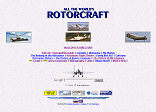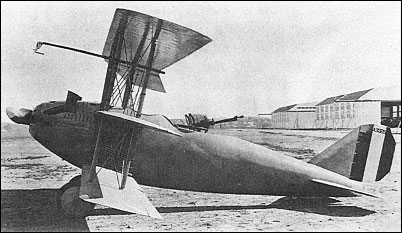|
| Designed by Charles B Kirkham, the Curtiss 18-T twoseat
fighter triplane was ordered by the US Navy on 30
March 1918 when a contract was placed for two prototypes.
The first of these was flown on 7 May 1918. Designed
around the Curtiss-Kirkham K-12 water-cooled
12-cylinder engine of 400hp, the 18-T was of extremely
clean aerodynamic design by contemporary standards
and featured a monocoque three-ply fuselage and side
radiators positioned between the lower wings. The
proposed armament comprised two forward-firing synchronized
7.62mm Marlin machine guns and
two 7.62mm Lewis guns on a Scarff mounting
in the rear cockpit. Known unofficially as the "Wasp"
(an allusion to the sound emitted by the K-12 engine
during landing approach), the 18-T initially suffered
some tail heaviness which was corrected by applying
five degrees of sweepback to the wings for further
trials. A max speed of 262km/h was
achieved with full military load in August 1918, the 18-T
being acclaimed as the world's fastest aeroplane as a
result. The US Navy promptly ordered two examples, the first of which was delivered in February 1919. In the
summer of 1919, the first prototype was fitted with
longer-span two-bay wings, these having a span and
area of 12.38m and 37.16m2 respectively,
and in this form the aircraft became the
18T-2, the short-span version becoming the 18T-1. The
18T-2 established a world altitude record of 10640m on 18 September 1919, and a second 18T-2
was built by Curtiss for export to Bolivia, where it
arrived in 1920.
 | A three-view drawing (1280 x 926) |
| MODEL | 18T-1 |
| WEIGHTS |
| Take-off weight | 1383 kg | 3049 lb |
| Empty weight | 898 kg | 1980 lb |
| DIMENSIONS |
| Wingspan | 9.70 m | 32 ft 10 in |
| Length | 7.11 m | 23 ft 4 in |
| Height | 3.02 m | 10 ft 11 in |
| Wing area | 26.76 m2 | 288.04 sq ft |
| PERFORMANCE |
| Max. speed | 265 km/h | 165 mph |
| jerry, e-mail, 07.11.2015 22:50 where to get plans for curtiss 18 wasp or HR reply |
| thomas, e-mail, 14.06.2015 06:45 I have a propeller that is 102 inches and has the lettters and numbers as follow DES. H-561.X.R.H I M NOT SURE IF THE TWO H'S COULD BE TWO II INSTEAD OF AGAIN H IT ALSO HAS ON IT NO. 12552 LET ME KNOW IF YOU COULD WHAT IT CAME FROM AND IF IT IS WORTH SOMETHING reply | | Lewis Westfall, e-mail, 22.07.2014 16:09 How did the Curtiss 18T-2 reach almost 35,000 feet without a supercharger? reply |
|
Do you have any comments?
|
| 
COMPANY
PROFILE
All the World's Rotorcraft
|








podrias proporcionar los planos por favor
reply